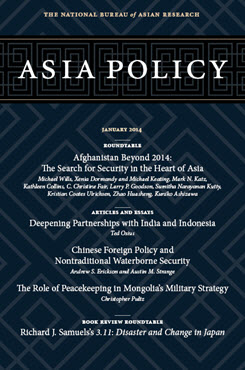Putin's Predicament
Russia and Afghanistan after 2014
This is one of nine essays in the roundtable “Afghanistan Beyond 2014: The Search for Security in the Heart of Asia.”
Russian press commentary during 2013 indicates that Moscow is fearful that the withdrawal of the International Security Assistance Force (ISAF) from Afghanistan at the end of 2014 will only have negative implications for Russian security interests. Russian observers do not believe that Afghan government forces can effectively deal with a resurgent Taliban, do not see Afghanistan’s current president (Hamid Karzai) as an effective leader, and do not believe that the 2014 Afghan presidential elections will lead to anything but political infighting that will only benefit the Taliban.
Russian commentators seem convinced that once ISAF withdraws, the Taliban will sooner or later reassert control over most (if not all) of Afghanistan. And once the Taliban does this (or even before), it will immediately act to support jihadist groups seeking to bring about the downfall of the post-Soviet Central Asian governments and replace them with radical Islamist ones that are hostile to Russia. Further, Russian commentators blame this state of affairs squarely on the United States for not having defeated the Taliban once and for all. But while some view the resurgence of the Taliban as being the result of U.S. incompetence, others believe that this is what Washington wants in order to weaken Russia. [1]
So what can Moscow do to prevent these negative consequences resulting from ISAF’s departure? Russian commentators are certainly not advocating that ISAF be replaced by Russian, Collective Security Treaty Organization (CSTO), or Shanghai Cooperation Organisation (SCO) forces. The negative experience of the 1979–89 Soviet intervention in Afghanistan has not been forgotten in Moscow, which does not want to repeat that experience. What Russian commentators are discussing is reintroducing a Russian military presence along the Tajik-Afghan border. But despite what they see as the obvious benefits of Russian protection for Tajikistan, Russian observers see its president, Emomali Rakhmon, as demanding concessions that are unacceptable to Moscow in exchange for his cooperation. [2]
Similarly, Uzbek president Islam Karimov is seen as being suspicious that the true purpose of a Russian (or even CSTO or SCO) troop presence would not be to defend Uzbekistan against the Taliban but to overthrow him. [3]
Moscow, of course, will have options in post-ISAF Afghanistan (even if Russian commentators do not see them yet). Just as the Najibullah government remained in office for over three years after the completion of the Soviet withdrawal from Afghanistan in 1989, the post-Karzai government may prove more resilient than is currently anticipated. If so, Russia—along with other nations—can improve the Karzai government’s prospects for survival by providing it with arms and possibly advisers.
In addition, even if the United States and its Western allies completely depart from Afghanistan, there are other states in the region that share Russia’s interest in preventing the Taliban from regaining control over Afghanistan or, if it does, from destabilizing neighboring countries. The Central Asian republics obviously share these interests with Russia, though their capacity to act in Afghanistan is limited. Iran and India are also opposed to the resurgence of the Taliban, and their capacities to act are far greater.
From 1996 to the U.S.-led intervention just after September 11, Iran and Russia both worked to help the Northern Alliance prevent the radical Sunni Taliban (which was hostile to Shia Iran as well as to Russia) from overrunning all Afghanistan. With the Taliban so closely allied to India’s archrival Pakistan, New Delhi too was unhappy to see it come to power back in 1996. Without the ISAF presence in Afghanistan serving to protect Iranian and Indian security interests vis-à-vis the Taliban and Pakistan, both Iran and India may have a strong incentive to work with Russia against them.
Regarding China, Russian commentators are not pleased about how closely Beijing cooperates with Pakistan or with its seeming indifference to the Taliban. One article in the Russian press warning that Xinjiang is becoming China’s Chechnya and that the United States supports jihadists based in Afghanistan and Central Asia who seek to weaken Chinese rule…
[1] For a sampling of this discussion, see Yelena Chernenko, “The Situation in Afghanistan Does Not Inspire Optimism,” Kommersant, April 25, 2013, 7, cited in The Current Digest of the Russian Press 65, no. 17–18 (2013): 19; Alexander Golts, “Alone Against the Taliban,” Moscow Times, May 14, 2013, http://www.themoscowtimes.com/opinion/article/alone-against-the-taliban/479917.html; Sergei Kozhemyakin, “The Afghan Debacle,” Sovetskaya Rossia, June 27, 2013, 7, cited in The Current Digest of the Russian Press 65, no. 26 (2013): 18–19; and “Russia Preparing for War on Its Own Territory,” Nezavisimaya gazeta, June 27, 2013, 2, cited in The Current Digest of the Russian Press 65, no. 26 (2013): 20.
[2] Vladimir Mukhin, “ ’Pyandzh’ Plan for Russian Border Troops,” Nezavisimaya gazeta, May 20, 2013, 1, cited in The Current Digest of the Russian Press 65, no. 21 (2013): 12–13.
[3] Golts, “Alone Against the Taliban.”
About Asia Policy
Asia Policy is a peer-reviewed scholarly journal presenting policy-relevant academic research on the Asia-Pacific that draws clear and concise conclusions useful to today’s policymakers. Asia Policy is published quarterly in January, April, July, and October and accepts submissions on a rolling basis. Learn more


